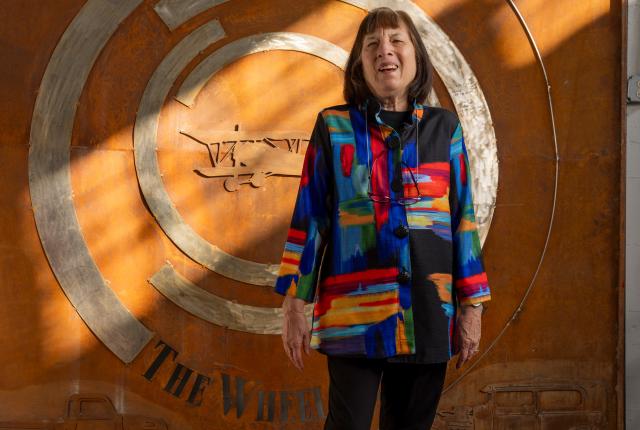LEBA FREED HAS BEEN WORKING to preserve the Albuquerque Rail Yards for nearly four decades. Built in 1914 to service steam locomotives as part of the railroad expansion that occurred in the early 20th century, the massive site and its Industrial Age buildings were left to decay after closing in 1977. Now, thanks in large part to Freed, the historic property once again serves as a thriving space that hosts special events and weekly markets, stars as the backdrop for films and TV shows, and houses the Wheels Museum and its 5,000 items relevant to the history of transportation in New Mexico.
As founder of the volunteer-run, nonprofit museum, located on Second Street just north of Avenida Cesar Chavez, Freed is determined to revive other buildings on the lot. Her priority is the former machine shop. Spanning three-and-a-half acres, the largest and most recognizable building in the Rail Yards once brought together rail workers from all across the state and 27 countries to create, maintain, and repair some of the biggest pieces of train equipment in the world. The machine shop could fit at least 25 steam locomotives at a time; the heavy machinery bay alone featured two 15-ton overhead traveling cranes to lift and move whole railcars.
“We did a federally funded study that shows that if we can make the Wheels Museum happen in the machine shop, which would also display steam locomotives, airplanes, and car exhibits, we can bring a million people a year to Albuquerque,” says Freed. Beyond the economic boost, she adds, it’s crucial to preserve this history that so directly influenced the rest of the United States. “We are the epicenter—the heart—of Route 66, El Camino Real, and these transportation industries,” she says.
To realize her dream, however, would require an estimated $100 million. So Freed works closely with local and federal lawmakers while collaborating with other organizations and museums, including the Smithsonian Institution, on her plans for the Wheels Museum expansion.
Freed and her family span five generations in Albuquerque. Her grandparents left Russia to escape Jewish persecution, relocating in New York, then Iowa, before arriving in Albuquerque at a doctor’s recommendation to improve her father Max’s health. With his brothers, Max formed the Freed Company in downtown Albuquerque. He married Leba’s mother, Marcia Hertzmark, a prominent labor lawyer who practiced law in Santa Fe. To the people who know Freed, it’s clear that the family work ethic lives on in her.
“She’s tireless,” says museum volunteer Steve Perry. At the current museum, visitors can find model train sets, restored full-size cars, carriages, a working train ride, tools, books, countless toys and figurines, and more.
“Without Leba’s vision and perseverance, all of this history may have been lost,” adds museum volunteer Ann Edenfield Sweet.
“We try to bring the community into the museum as much as possible,” says Freed, adding that she’s always looking for innovative ways to meet financial goals. Volunteers once brought in a horse with a paintbrush attached to its bridle; for a donation, guests could have museum T-shirts painted by the horse. But Freed’s ultimate goals are much larger.
“The machine shop is what turned us into a city,” she says. “I want to make a place in Albuquerque, New Mexico, where people from around the world say, The only place you can see that is in Albuquerque, New Mexico.”
Read more: The activist creates change so members of the LGBTQ+ community can thrive.



